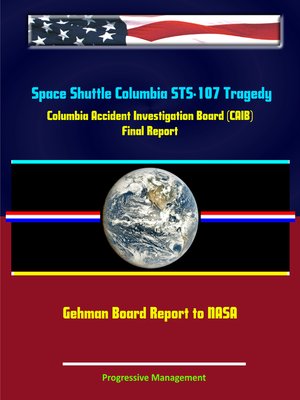Space Shuttle Columbia STS-107 Tragedy
ebook ∣ Columbia Accident Investigation Board (CAIB) Final Report, Gehman Board Report to NASA
By Progressive Management

Sign up to save your library
With an OverDrive account, you can save your favorite libraries for at-a-glance information about availability. Find out more about OverDrive accounts.
Find this title in Libby, the library reading app by OverDrive.



Search for a digital library with this title
Title found at these libraries:
| Loading... |
This is the official final report (Volume One) issued by the Columbia Accident Investigation Board (CAIB) (also known as the Gehman Board after its chairman, Harold Gehman) on the last flight of space shuttle Columbia, which ended in the horrible, sudden loss of the vehicle and crew during entry on February 1, 2003.
The report has been professionally converted for accurate flowing-text ebook format reproduction.
The opening statement of the board's report says: "We sought to discover the conditions that produced this tragic outcome and to share those lessons in such a way that this nation's space program will emerge stronger and more sure-footed. If those lessons are truly learned, then Columbia's crew will have made an indelible contribution to the endeavor each one valued so greatly. After nearly seven months of investigation, the Board has been able to arrive at findings and recommendations aimed at significantly reducing the chances of further accidents. Our aim has been to improve Shuttle safety by multiple means, not just by correcting the specific faults that cost the nation this Orbiter and this crew. With that intent, the Board conducted not only an investigation of what happened to Columbia, but also to determine the conditions that allowed the accident to occur – a safety evaluation of the entire Space Shuttle Program."
The executive summary states: "The Board recognized early on that the accident was probably not an anomalous, random event, but rather likely rooted to some degree in NASA's history and the human space flight program's culture. Accordingly, the Board broadened its mandate at the outset to include an investigation of a wide range of historical and organizational issues, including political and budgetary considerations, compromises, and changing priorities over the life of the Space Shuttle Program. The Board's conviction regarding the importance of these factors strengthened as the investigation progressed, with the result that this report, in its findings, conclusions, and recommendations, places as much weight on these causal factors as on the more easily understood and corrected physical cause of the accident. The physical cause of the loss of Columbia and its crew was a breach in the Thermal Protection System on the leading edge of the left wing, caused by a piece of insulating foam which separated from the left bipod ramp section of the External Tank at 81.7 seconds after launch, and struck the wing in the vicinity of the lower half of Reinforced Carbon-Carbon panel number 8. During re-entry this breach in the Thermal Protection System allowed superheated air to penetrate through the leading edge insulation and progressively melt the aluminum structure of the left wing, resulting in a weakening of the structure until increasing aerodynamic forces caused loss of control, failure of the wing, and breakup of the Orbiter. This breakup occurred in a flight regime in which, given the current design of the Orbiter, there was no possibility for the crew to survive. The organizational causes of this accident are rooted in the Space Shuttle Program's history and culture, including the original compromises that were required to gain approval for the Shuttle, subsequent years of resource constraints, fluctuating priorities, schedule pressures, mischaracterization of the Shuttle as operational rather than developmental, and lack of an agreed national vision for human space flight."
World Spaceflight News has covered the Space Shuttle program since its inception, and we had the unfortunate duty of reporting on the Challenger tragedy in 1986. We had hoped that such a profound disaster would never occur again. America will always...






